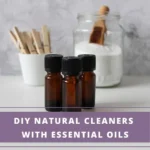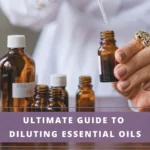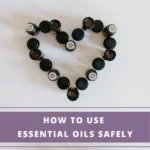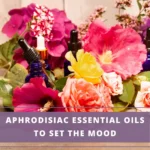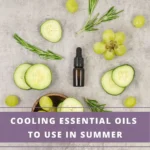As an Amazon Associate I earn from qualifying purchases. See Full Disclosure Here
Understanding what are carrier oils for essential oils, how they work, and why you need to use them is crucial before you start using essential oils. This is especially important before applying essential oils directly to your skin.
Carrier oils play a vital role in the safe and effective use of essential oils for various applications. They not only dilute the potency of essential oils but also help in their absorption into the skin.
If you are planning on creating your own perfumes, skincare, or bath products using essential oils, take time to understand the basics about carrier oils before you get started.
Here’s what you’ll find as you scroll below:
What Are Carrier Oils for Essential Oils? What Do They Do?
Why Use Carrier Oils to Dilute Essential Oils? Why Not Use Water?
Essential Oils Vs Carrier Oils: What is the Difference?
Carrier Oils vs. vegetable Oils
Which are the Best Carrier Oils for Essential Oils?
What are Carrier Oils for Essential Oils? What Do They Do?

Carrier oils are base oils or vegetable oils that are rich in essential fatty acids. They are obtained by cold-pressing the fatty portions of the plant, usually the nuts, kernels, or seeds.
Carrier oils are used to dilute essential oils before topical application to prevent potential skin irritation or sensitivity.
Essential oils are highly concentrated extracts obtained from the leaves, stems, and roots of various plants. When applied topically in their pure undiluted form, these highly potent oils can trigger adverse reactions.
Using a carrier oil helps spread the essential oil evenly over the skin, enhancing its therapeutic effects without causing skin irritation, sensitivity, or other adverse reactions.
The term carrier oil is appropriate when you consider that the main purpose of these oils is to carry the essential oil onto the skin.
By themselves, carrier oils contain ingredients that moisturize and nourish the skin. When you use carrier oils with essential oils, you get the skin-nourishing benefits of both.
There is no one best carrier oil for essential oils. Different oils have different properties. The best one for you will depend on the result you are hoping to achieve. Also, some carrier oils are better suited for certain applications than others.
Why Use Carrier Oils to Dilute Essential Oils? Why Not Use Water?

That’s the question on everybody’s mind. We generally use water for diluting most other substances so why use carrier oils for diluting essential oils?
The reason water cannot be used for diluting essential oil is that oils and water do not mix well together. Oils have a lighter density than water. When you add oil and water in any container, the water sinks to the bottom, and the oil floats to the top.
Even if you shake the container well, the oil will form droplets that scatter throughout the water but it won’t dissolve. When you let the liquid stand, the oil will float to the top again.
Essential oils behave the same way except for one difference – they are also more volatile. When mixed with water, they will float to the top and evaporate quickly, leaving behind plain water in the container.
When you dilute essential oil with water and apply it to your skin, the more volatile essential oil will seep into your skin quickly leaving the water on the surface. This undiluted oil that gets absorbed into the skin is highly concentrated and causes skin irritation.
However, when you add carrier oil to essential oil, both oils mix well together forming one smooth blend. You cannot differentiate between the two.
For topical applications, you would generally add just a drop or two of essential oil to a tablespoon of carrier oil. When you apply this mix of oils topically, it is the larger amount of carrier oil that comes in contact with your skin. The amount of essential oil used is sufficient to give you the benefits but not enough to cause any adverse reaction.
Carrier oils also contain ingredients such as vitamin E and essential fatty acids that nourish and moisturize the skin so you get twice the benefits with every application.
CARRIER OILS V/S. ESSENTIAL OILS
So what exactly is the difference between essential oils and carrier oils? Here’s a quick comparison between the two:
• Origin and extraction – Essential oils are extracted by steam distilling or cold pressing the bark, leaves, roots, rinds, and other aromatic parts of various herbs, plants, and trees. Carrier oils, on the other hand, are extracted by cold-pressing fatty portions such as kernels, seeds, and nuts of different plants and trees.
• Aroma – Essential oils have a highly concentrated aroma that is characteristic of the plant from which they are extracted. Carrier oils also get their aroma from the plant from which they are extracted but their aroma is much milder and in some cases, almost indiscernible.
• Characteristics – Essential oils evaporate quickly and are not as oily to the touch as carrier oils. Carrier oils on the other hand feel distinctly oily and do not evaporate as quickly.
• Shelf life & Efficacy – Carrier oils get rancid and develop an unpleasant odor when kept for too long. Essential oils do not get rancid with time. However, they lose their therapeutic benefits over a period of time. This is because they tend to oxidize slowly every time the bottle is opened.
Learn more about the differences in this comprehensive guide to essential oils vs. carrier oils.
Carrier Oils V/S. Vegetable Oils
Vegetable oils that you buy from grocery stores for cooking are not cold-pressed. These cooking oils are processed using heat, which destroys the fragile therapeutic components of the oil. At best, cooking oils would do nothing for your skin. Some may even be harmful.
When you want to get the best carrier oils for essential oils, it is always advisable to buy them from reputed brands.
Best Carrier Oils for Essential Oils
1. Fractionated Coconut Oil
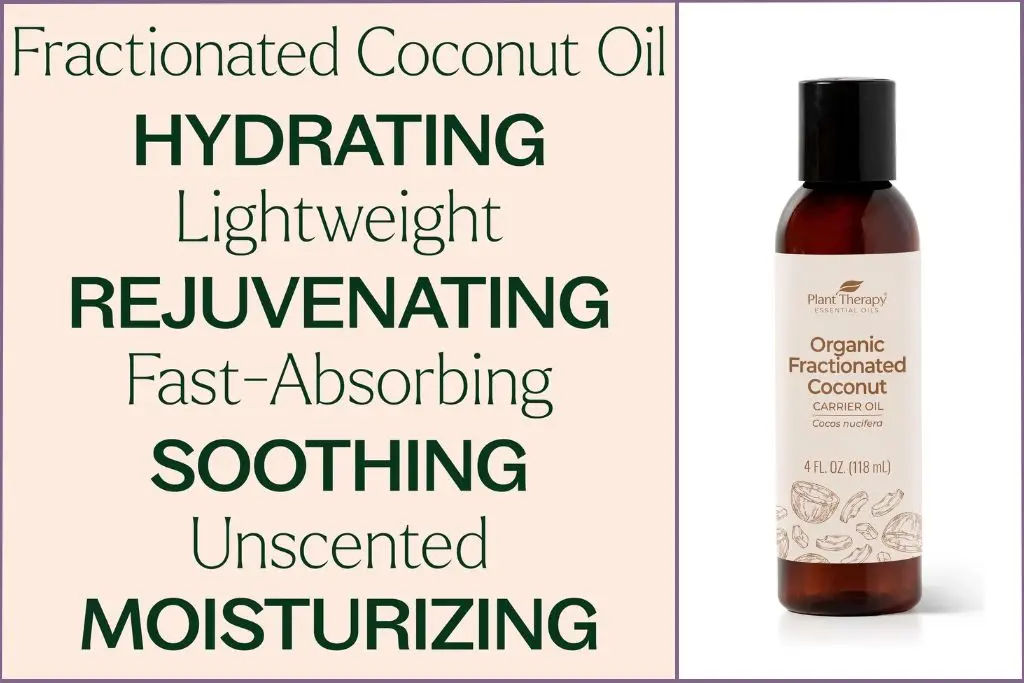
Fractionated coconut oil is the best carrier oil for essential oil for several reasons.
The first is due to its protective, emollient, and nourishing properties, which truly pampers the skin.
Secondly, fractionated coconut oil gets absorbed more readily into the skin. When applied topically, it forms a nourishing, protective barrier on the skin without feeling greasy or clogging the pores.
Best of all, it has a subtle, pleasant scent of coconut that does not interfere with the aroma of the essential oil. When you mix both oils, the essential oil aroma will shine through while the coconut oil provides silent, undetectable support.
Organic fractionated coconut oil is extracted using a special process that refines and clarifies the oil without affecting its therapeutic properties. It is rich in vitamin E, making it ideal for dry, dehydrated, damaged, or mature skin.
This is a must-have carrier oil if you like making your own personal care products using essential oils. It helps cleanse and nourish the skin, soothe sunburn, and strengthen hair and nails.
Coconut oil is also easy to apply and does not dry out easily, which makes it the perfect base for making your own massage oils.
The only precaution when using coconut oil for essential oils – if you have acne-prone or very oily skin, you may want to consider a different oil for facial use.
2. Jojoba Oil
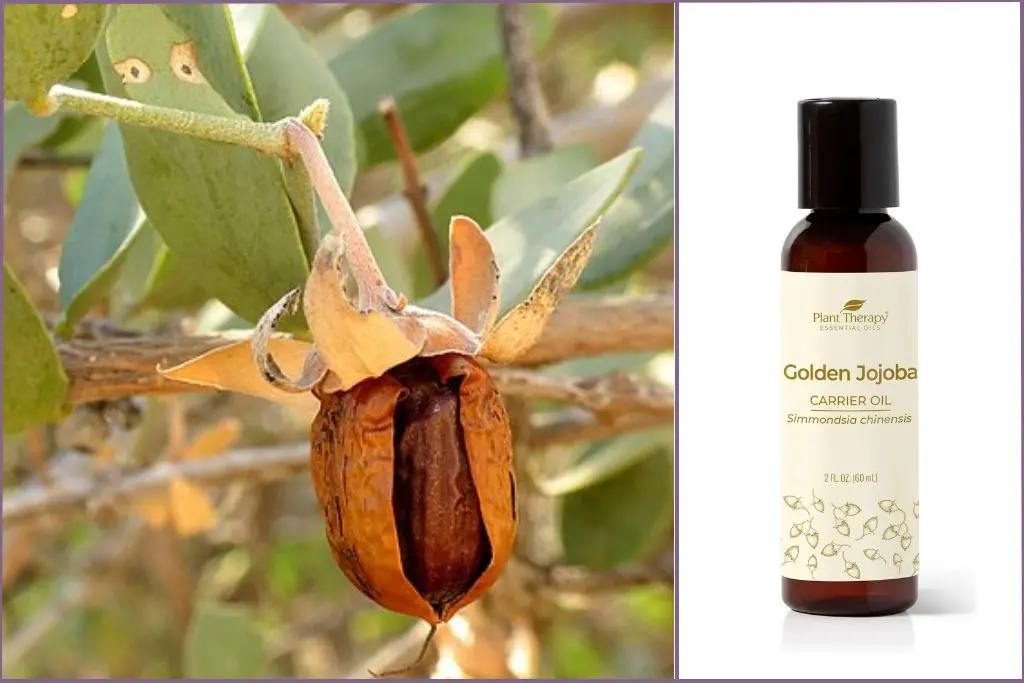
Non-greasy and odorless, Jojoba is the best carrier oil for essential oils when making lip balms, body butters, and lotion bars.
What’s really interesting about jojoba oil is that it is not really an oil at all. Despite its name, it is in fact a liquid wax that has the same consistency and properties as the oil obtained from the sperm whale.
Earlier, the oil from sperm whales was used as a base for a wide range of skincare products and cosmetics. It was replaced with jojoba oil after whaling was banned in the 1970s.
The oil is extracted by cold-pressing the seeds of the Jojoba plant. The resultant extract is a liquid wax that closely resembles the natural sebum of the skin. It is rich in vitamin E, wax esters, and other nutrients that give the oil its exceptional emollient, and protective properties.
When massaged into the skin, Jojoba oil acts as a natural emulsifier and anti-inflammatory agent. It is also non-comedogenic, which means it won’t clog pores.
Organic Jojoba oil can be used to soothe chapped, reddened or sunburned skin. Gently patting jojoba oil over the skin regularly helps reduce the appearance of fine lines and wrinkles.
Jojoba is a good carrier oil for all skin types, including sensitive, oily, acne-prone, and mature skin. It is especially beneficial for skin conditions such as eczema and psoriasis. Jojoba oil also works well as a cleansing oil and for soothing rashes.
3. Sweet Almond Oil
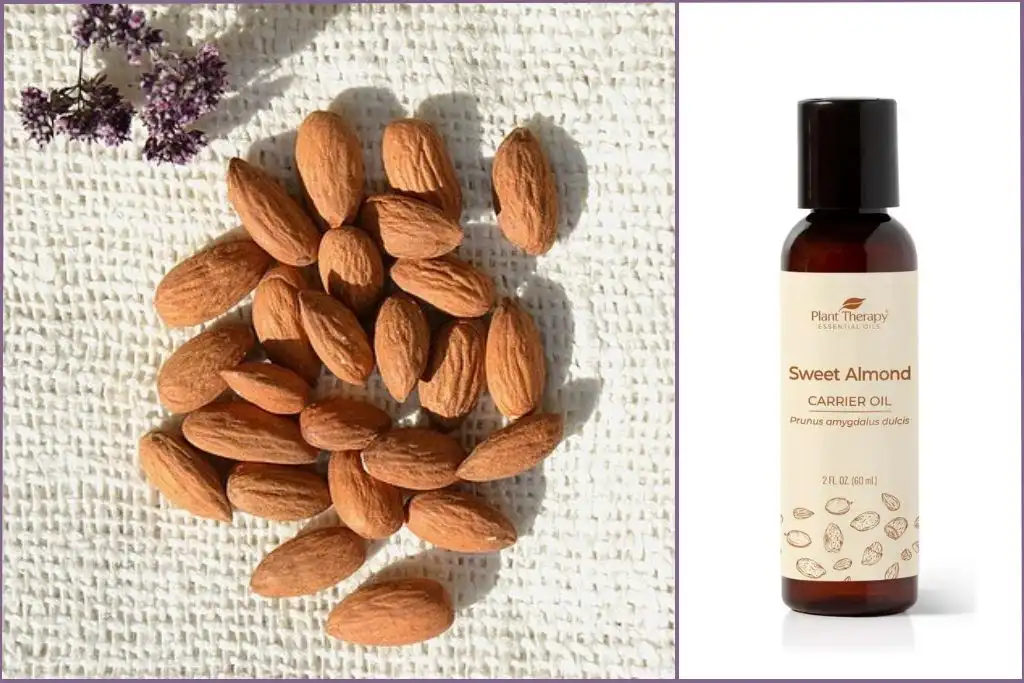
Rich in essential fatty acids such as oleic and linoleic acids, sweet almond oil is an excellent all-purpose carrier oil known for its softening, moisturizing, and nourishing properties.
Suitable for all skin types, it can be used in face oils, body or massage oils, creams, lotions, and other balms and ointments.
The superfine texture of sweet almond oil allows it to be absorbed into the skin more easily, leaving it soft and supple without feeling greasy. It is also rich in vitamins A, D, and E and works wonders for dry, itchy, and sensitive skin.
Sweet almost oil is the best carrier oil for creating massage oils with essential oils. When massaged into the skin, the oil penetrates into the deeper layers of the skin, soothing and nourishing dry, irritated areas.
It is also a great choice for creating bath care products and is an excellent addition to sugar and salt scrubs, lotion bars, and balms.
Sweet almond oil is suitable for all skin types and can be used in body care products at 100% strength. However, if you have nut allergies, be sure to perform a patch test before using it extensively over a larger area. Better still, to be on the safe side, use coconut or jojoba oil instead.
4. Argan Oil
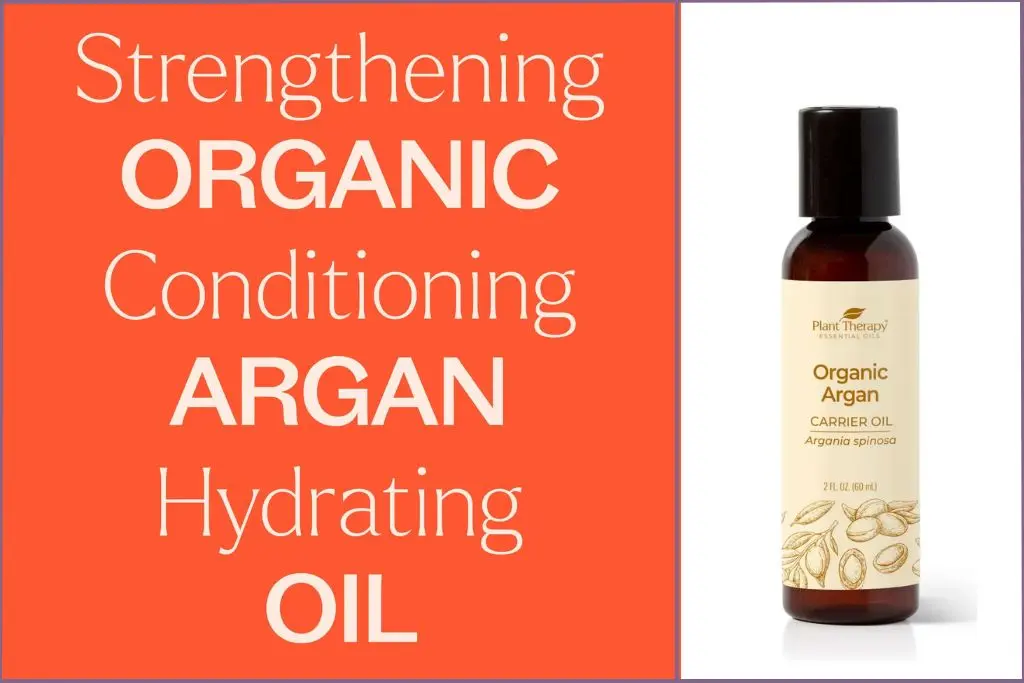
Argan oil is one of the best carrier oils for essential oils when creating anti-aging skincare products.
Cold-pressed from the nut of the Moroccan Argan Tree, this oil is rich in antioxidant vitamin A, which encourages cellular regeneration and restores skin elasticity. Both of these help diminish the appearance of fine lines so your skin looks softer, smoother, and younger.
Argan oil has long been the carrier oil of choice for strengthening hair, nails, and, cuticles. It also protects the cells from sun and environmental damage, prevents the formation of stretch marks, and minimizes scarring.
This carrier oil absorbs quickly and is suitable for all skin types including sensitive skin. It helps reduce sebum levels in oily skin, which helps reduce breakouts. Combining argan oil with the right essential oils helps double the acne-fighting and anti-aging benefits.
5. Apricot Kernel Oil
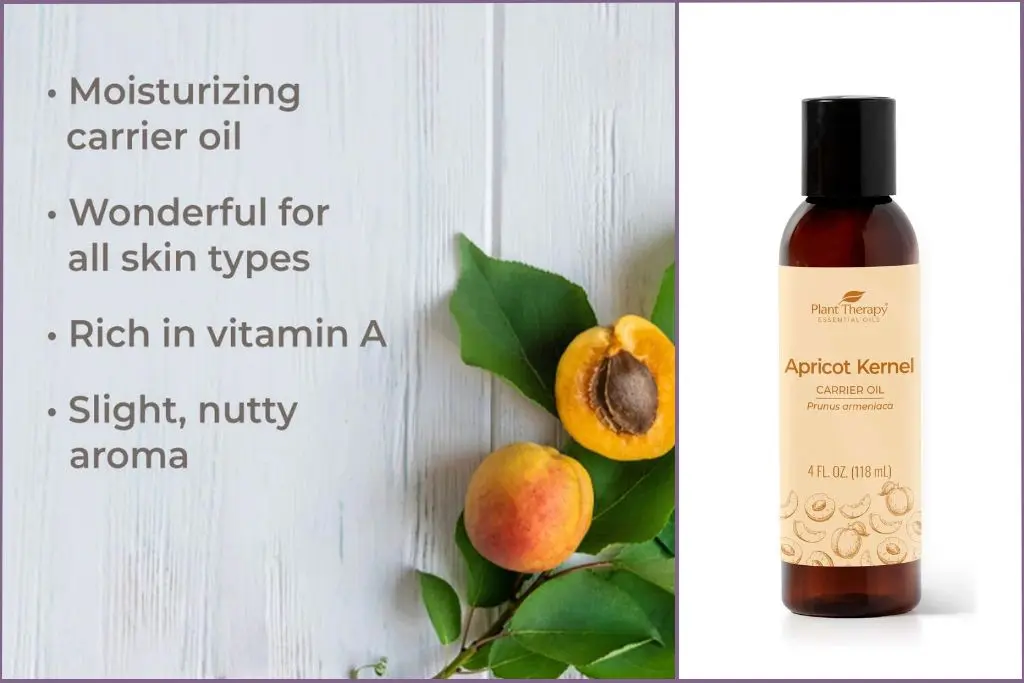
Rich in linoleic acid and oleic acid, apricot kernel oil has superior nourishing, moisturizing, and emollient properties. It is an excellent carrier oil for all skin types, especially dry, delicate, and sensitive skin.
Apricot kernel oil has a super-fine texture and is easily absorbed by the skin without leaving it feeling oily. Its anti-inflammatory properties make it one of the best carrier oils for creating massage oils for sensitive, dry, or irritated skin.
This nourishing and moisturizing oil can calm and soothe your skin while improving its condition and elasticity, thanks to its rich content of vitamin E, omega 9, and essential fatty acids.
6. Rosehip Oil
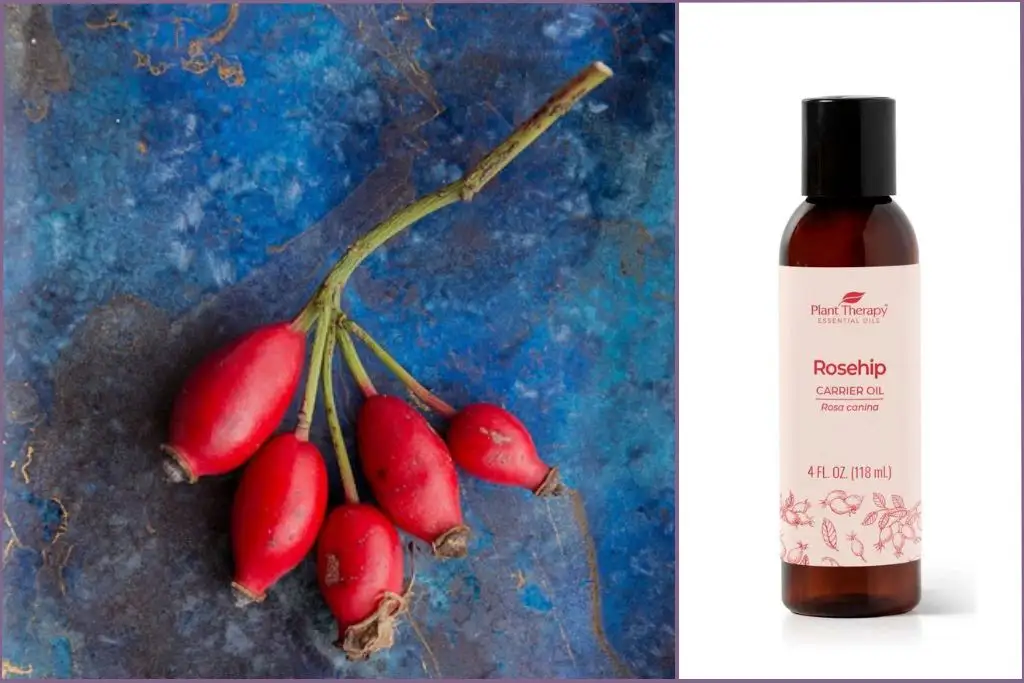
Rosehip oil is extracted by cold-pressing rosehip seeds. It is rich in vitamin E, vitamin A, and essential fatty acids, which increase collagen and elastin levels and promote cell regeneration. Not surprisingly, it is a key ingredient in creams, lotions, and face, massage, and body oils.
Its superior moisturizing properties make rosehip oil a good choice for nourishing dry skin. It also helps fade blemishes, marks, scars, and stretch marks.
Rosehip is the best carrier oil for rosacea because of its anti-inflammatory properties, which help soothe the itchiness and redness associated with this skin condition.
In high concentrations, this oil may aggravate oily skin and must be used sparingly.
Plant Therapy offers an Extra Virgin Rosehip oil, which is obtained by a single, simple pressing. This is the highest quality you can find anywhere.
Rosehip has a distinct aroma that’s part nutty, part earthy. The scent is one reason why it is not so popular in making face creams.
Fun fact: Rosehip oil has nothing to do with the rose plant. I’ve read so many articles that say rosehip oil is extracted from the rose plant – from the portion just below the petals. That’s not right at all
7. Evening Primrose Oil
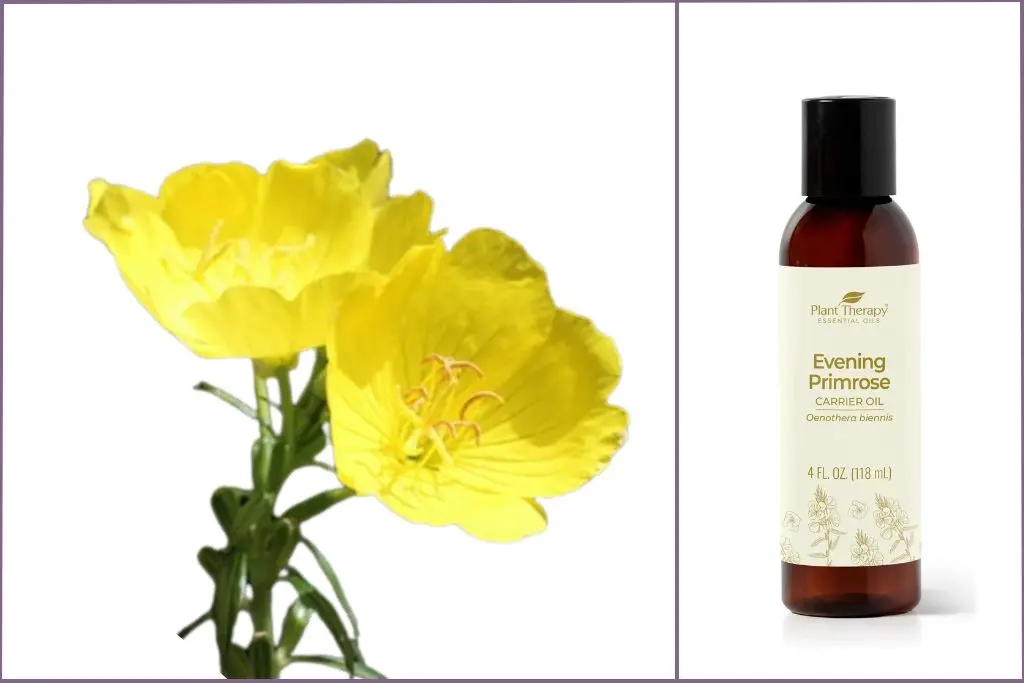
Evening primrose oil is cold-pressed/refined from the seeds of the evening primrose flower. The refining process removes the inherent scent of the oil.
Evening Primrose carrier oil contains high levels of nourishing fatty acids. It penetrates deeply into the skin, nourishing and soothing from within. It is one of the best carrier oils to use in creams and lotions formulated for very dry or mature skin
There are several ways to use evening primrose oil by itself or in essential oil blends. Massaged undiluted into the skin during winter, it helps soothe and nourish from within, reducing dryness and skin irritation. It also helps reduce flakiness and dandruff when massaged directly into the scalp or added to a shampoo.
8. Grapeseed Oil
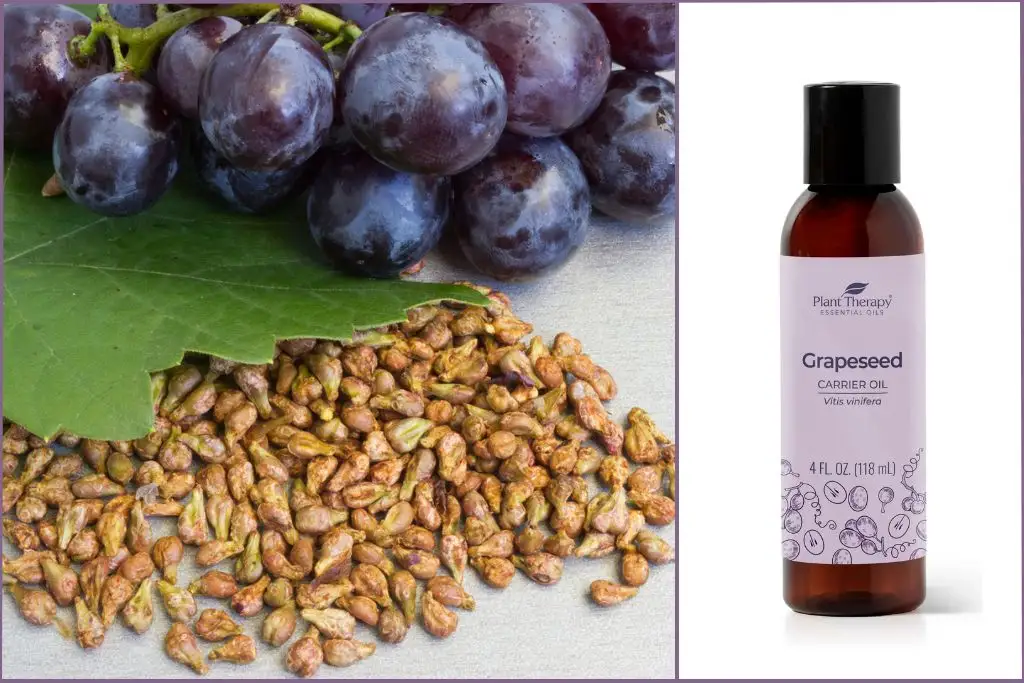
Grapeseed oil is a light, easily absorbed carrier oil with antioxidant and restructuring properties. It is extracted by cold-pressing the seeds of certain grape varieties.
Considered an all-purpose oil, grapeseed carrier oil has a light aroma that is partly nutty, and partly sweet. A benefit of this carrier oil is that it helps control sebum production and can help prevent acne.
Grapeseed is a good carrier oil for all skin types and is particularly beneficial for oily or acne-prone skin, as it does not clog pores. When massaged into the skin undiluted, it leaves a slightly glossy film on the skin.
It can be used in face oils, massage oils, creams, and lotions for a rejuvenating experience.
9. Avocado Oil
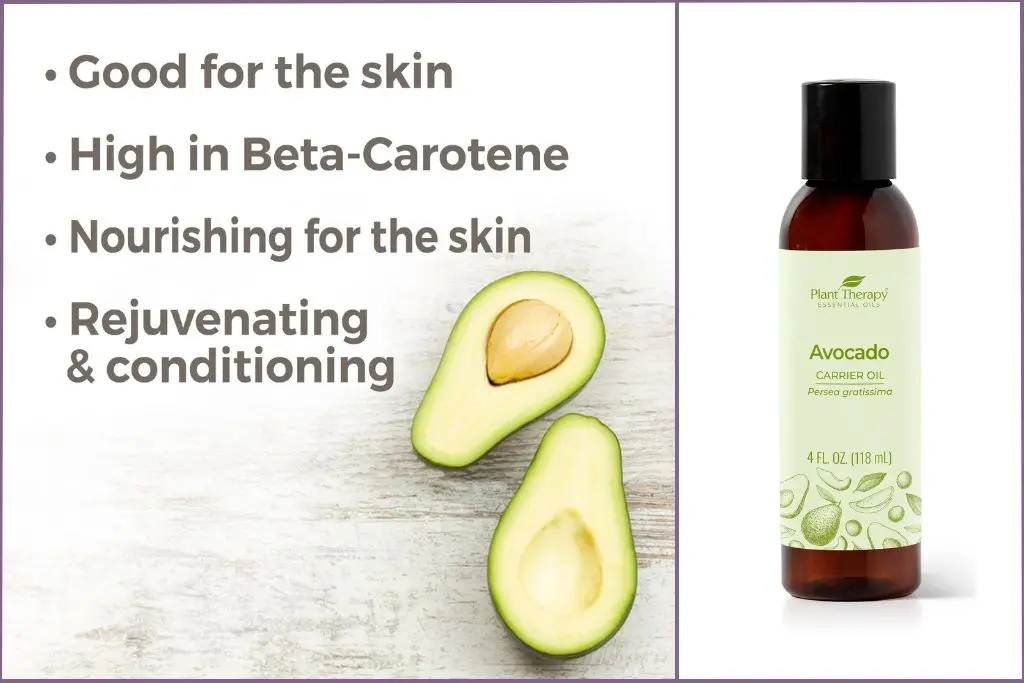
Avocado oil is rich in essential fatty acids, particularly oleic acid, which makes it an ideal choice for skincare. Additionally, it contains vitamins E, A, and D, as well as antioxidants, which all contribute to its nourishing and moisturizing abilities.
Derived from the flesh of the avocado fruit, the oil is exceptionally well-tolerated by most skin types. Its composition closely resembles the natural oils produced by our skin, making it less likely to cause skin irritation or allergies when used as a carrier oil.
Avocado carrier oil also has a high absorption rate, meaning it can penetrate the skin deeply, carrying essential oils along with it. This enhances the efficiency of the essential oils and ensures they reach their intended targets within the body.
The oil is packed with vitamins and antioxidants that can further nourish the skin while delivering the therapeutic benefits of essential oils. This combination can promote a healthy, radiant complexion.
10. Olive Oil
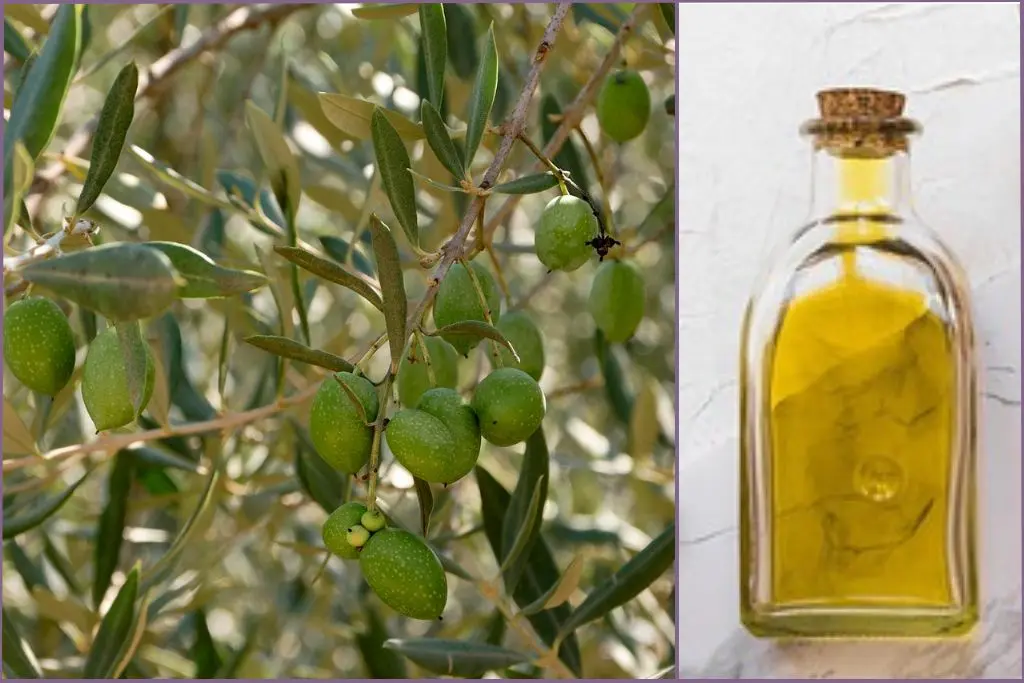
Olive oil is a nourishing and regenerative carrier oil that can be added to other carrier oil blends for enhanced benefits. Its high vitamin and mineral content works great to nourish dry hair and boost hair growth.
Olive oil is one of the heavier oils. While it is a great carrier oil for massages, it is a little too heavy and oily to be used regularly on normal or oily skin. It is the carrier oil of choice for dry, damaged, and flaky skin and to soothe skin conditions such as eczema.
Also, olive oil has a strong odor. This can interfere with the aroma of the essential oils used, which is why it isn’t commonly used when making perfumes or skin and bath care products.
If you don’t mind the strong smell of olive oil, you will find that it is one of the better massage oils. Of course, you want to make sure that you use only the highest quality organic, extra virgin olive oil such as that marketed by Plant Therapy. It is obtained from the first pressing of the olive and is packed full of nutrients.
Olive oil is the best carrier oil for making homemade salves and creams. Look for unrefined extra virgin olive oil for the purest form.
Using The Right Essential Oil To Carrier Oil Ratio Is Important
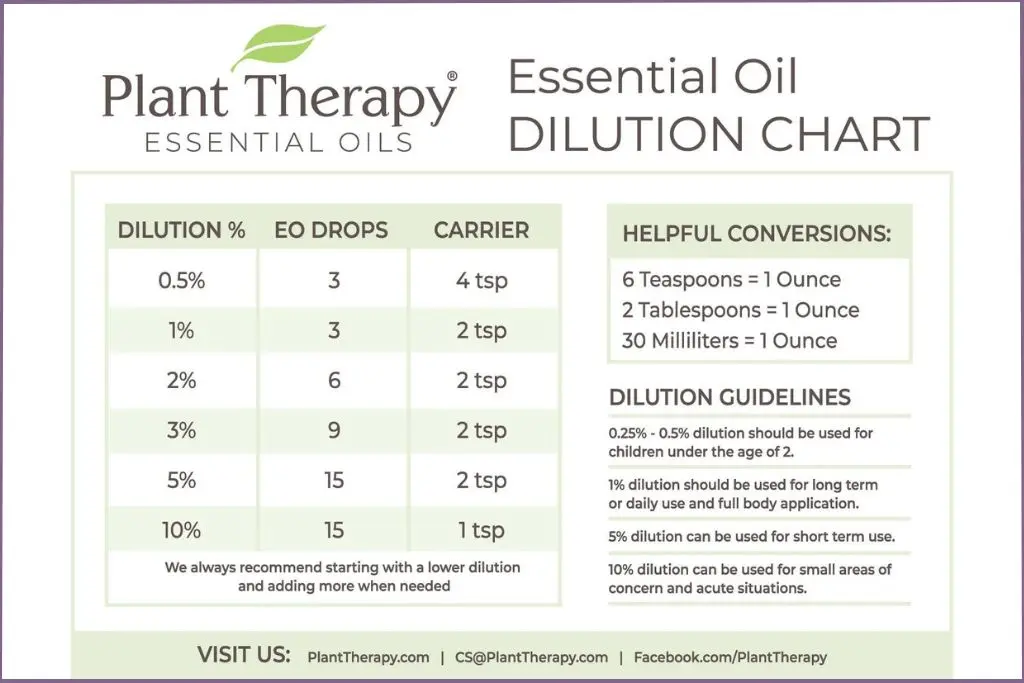
When diluting essential oils with carrier oils, using the correct dilution ratio is important. The dilution ratio is calculated as drops of essential oil to a teaspoon of carrier oil.
The reason it is done this way is because you literally need to use just a few drops of essential oil to a teaspoon of carrier oil. Using too little carrier oil will not offer the necessary protection from potent essential oils. Using too much will dilute the effect.
However, keeping track can be difficult, resulting in unfortunate mistakes. To minimize the chances of accidentally adding too many drops of essential oil, it’s a good idea to buy or create your own dilution chart. Most importantly, keep it somewhere handy so you can refer to it whenever you need to.
The Essential Oils Dilution Chart Magnet by Plant Therapy is one of the best ones I’ve come across. What I love about it is that the information is very clearly laid out AND the magnet makes it easy to keep it right where you need it.
They also have a KidSafe Dilution Chart Magnet, which is super handy for topical applications on kids’ skin.
A 2% dilution is recommended for most applications. To obtain this dilution, mix 6 drops of essential oil in 2 teaspoons carrier.
Get more details on dilution rates in this ultimate guide to diluting essential oils.
Pro tip: To get the fastest results, make sure to focus on the most effective pulse points for essential oils and carrier oils.
How To Choose The Best Carrier Oil For Essential Oil
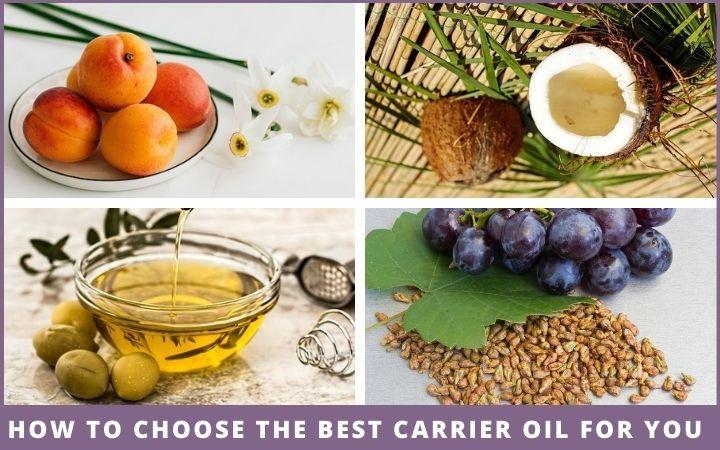
With so many different characteristics, therapeutic effects, and other precautions to heed, deciding the best carrier oil for essential oils can be confusing.
Moreover, there is no such thing as one best carrier oil for essential oils. All carrier oils are good for the skin. Which one is best for you depends on the results you are hoping to achieve.
In general, there are a few factors that you must take into consideration when looking for a carrier oil.
Use only virgin or cold-pressed vegetable oils – The best carrier oils for essential oils are cold pressed. It is the cold-pressed process that makes them so effective as carrier oils. Heat destroys the therapeutic properties of oil. To find out if a particular oil is cold-pressed, look at the label. If it does not say cold pressed or cold expeller pressed, it may not have any value as a carrier oil for the skin.
Choose organic oils – Organic carrier oils are derived from plants that are not exposed to any chemicals. Oils extracted from these plants won’t contain any contaminants so you know you’re applying the best possible skincare products.
Use only 100% pure oils – Read the label carefully to make sure that the carrier oil is pure and not a blend. Also, check that it does not contain any additives.
Check the manufacture and expiry date – The closer it is to the manufactured date, the fresher the oil will be and the more therapeutically potent. The closer it is to the expiry date, the less potent it will be. Its healing properties will be weaker too. If the ‘use by’ date has passed, throw it out, even if it looks and smells okay as this could cause skin irritation. It’s not worth the risk.
Always buy from reputed brands – Reputed brands maintain stricter quality control over their entire manufacturing process, guaranteeing a higher quality product. When you buy from an established brand you can rest easy knowing that you are using a high-quality product that is loaded with benefits.
HOW TO STORE CARRIER OILS
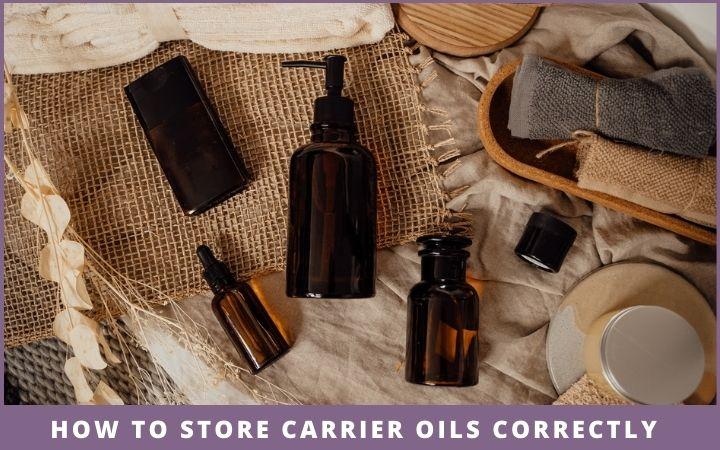
There is a right way and a wrong way to store carrier oils. When you’ve paid so much to buy the best carrier oils for essential oils, it pays to learn the right way so your investment will last longer.
In general, carrier oils have a longer shelf life than essential oils. They are not as potent as essential oils and do not deteriorate when kept in plastic bottles.
You can leave the oil in the original bottle if you plan on using it regularly. However, if you use the oil sparingly it’s best to transfer a little at a time into a smaller bottle. Every time you open the bottle, the oil gets exposed to small amounts of light and air, which could accelerate the deterioration process. Transferring it to a smaller bottle will extend the shelf life of the carrier oil.
Carrier oils are best stored in a cool, dark place but not necessarily in the refrigerator. Read the instructions in the bottle carefully for best storage practices. Some oils turn cloudy or even solidify when kept in the refrigerator. The cooler temperature may also alter the properties of the oil.
Precautions When Using Carrier Oils
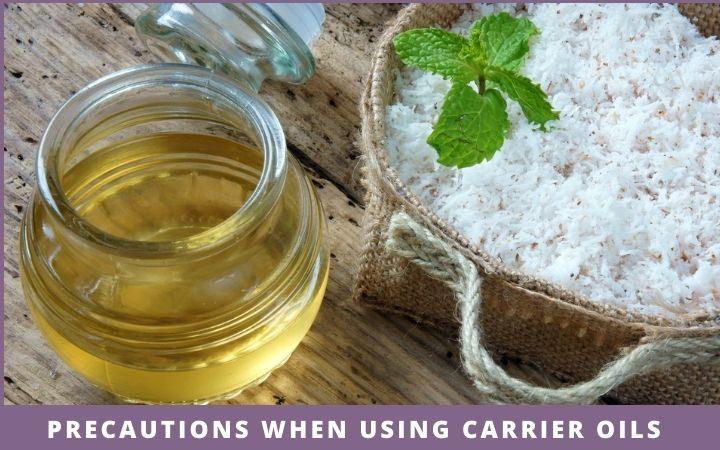
If this is the first time you’re using a particular carrier oil, do a patch test before applying it over a larger area. This is to ensure that your skin doesn’t react to the oil.
To do a patch test, apply a little bit to the inside of your wrist or the inside of your elbow. Wait a while to see if it causes any adverse reactions. If it doesn’t, you’re good to go.
Do not use almond, argan, or apricot kernel oil if you have nut allergies. If you need to use carrier oil as a base in your homemade gifts, it’s best to avoid these oils altogether and use coconut, jojoba, or evening primrose oil instead.
Check the shelf life of the carrier oils before using them in your DIY projects, especially if they’ve been lying around for a while. Shelf lives differ from one carrier oil to another. Check the ‘best before’ date before using. Using a carrier oil that is past its shelf life could irritate your skin.
Choosing the right carrier oil for essential oils is a crucial step in ensuring the safe and effective use of these potent natural remedies. By understanding the properties and benefits of various carrier oils, you can make informed decisions about which oils are best suited for your skin and hair type, as well as your desired application.
Can I Use Essential Oils Without Carrier Oil?

When it comes to topical applications of essential oils, it is absolutely necessary to mix them with carrier oils. This includes using essential oils for massages or incorporating them into DIY skincare and lip-care products such as lip balms, roll-ons, body butters, and salves.
Never apply undiluted essential oils directly to your skin. This is the #1 safety rule. These oils are highly concentrated and can lead to itching or skin rashes. Read these 15 essential oil safety tips to avoid this and other mistakes when using essential oils.
The only exception to this rule is when you are using essential oils in a diffuser. In fact, it’s important not to add carrier oils to a diffuser, as doing so can damage the mechanism. To learn more about using an essential oil diffuser correctly, you can read our guide on the topic.
Disclaimer: This information is not intended to serve as medical advice. Please consult your doctor before using any natural medication or if you experience any unusual symptoms. See Full Disclaimer here.


